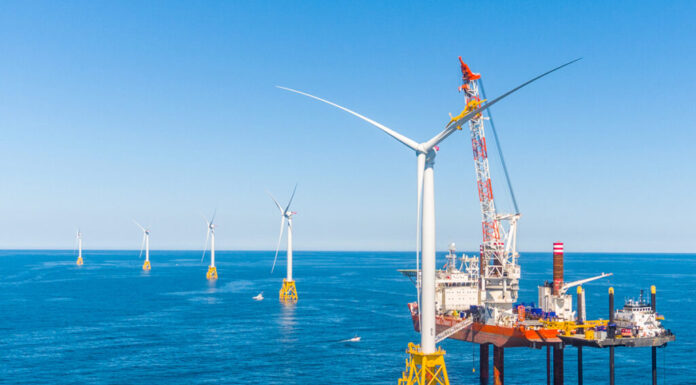
WARWICK – Developers of the Revolution Wind Farm are seeking to avoid the problems with undersea cables resurfacing that plagued Block Island.
Unlike on Block Island, where a jet plow was initially used to bury wind farm cables that later resurfaced, the two, 23-mile-long underwater electric lines connecting Revolution Wind to the mainland power grid will be drilled to the seafloor using a different technique called horizontal directional drilling, according to the application from Revolution Wind LLC submitted to the R.I. Energy Facility Siting Board.
Meaghan Wims, a spokesperson for Revolution Wind, said in an emailed statement that the cable burial method proposed for Revolution Wind “offers strong protection against future exposure.”
State energy regulators are set to begin final hearings on the project license application on Oct. 12, with a decision no later than 120 days later. The 88-turbine wind farm itself is not part of the application, but rather, the license to construct the cables and transmission lines that connect the turbines from federal waters off Block Island to land in Quonset Business Park, as well as plans for a new National Grid substation.
The board, which oversees construction of or major changes to energy facilities in the state, will make its decision based on criteria including economic benefits, environmental impacts, and whether the project meets the state’s energy needs at a reasonable cost to consumers. While cable burial techniques are not directly part of the scope of their review, avoiding the operational and financial headache of having cables emerge and have to be reburied are an indirect consideration.
A series of hearings and written opinions since the application was submitted in December 2020, indicate the project has broad support. All nine of the state and local agencies asked to provide advisory opinions, including the R.I. Department of Environmental Management, Quonset Development Corp. and the R.I. Department of Health, suggested they have no objections, according to filings with the Energy Facility Siting Board. Several also cited the economic and environmental benefits of the project, which help the state to meet its ambitious renewable energy goals and is estimated to create more than 3,000 direct and indirect jobs during construction.
North Kingstown will also receive an annual payment in lieu of taxes under a lease agreement with Quonset Development Corp., estimated to equal about $32,000 per year for 20 years, according to the application.
Other financial details, including the full cost of the project and estimated state income tax revenue, were redacted from public filings.
The energy board at its final hearings is expected to take up in greater detail some of the remaining questions raised during prior hearings and in advisory opinions. Among them: What happens if the project costs more than what is laid out in the agreement between Revolution Wind and National Grid? What is the plan, and cost, for taking down the turbines and removing the cable lines once the project ends? How will the developer handle traffic congestion and noise from construction of the onshore transmission cable, which will run along a residential stretch of Camp Avenue to Quonset Business Park?
In a September public hearing, some community members also expressed concern with the Camp Avenue transmission line.
Wims in response pointed out that the transmission route along Camp Avenue is short – less than a quarter mile -and will take one to three months to build.
A traffic plan to be submitted to the town will also offer further detail on minimizing traffic disruption during the project’s construction.
“All roads will be restored to as good, or better condition, once construction is complete,” Wims said.
Permits from a variety of other agencies, including the town of North Kingstown and the R.I. Coastal Resources Management Council, are still required for the project.
Project construction is expected to begin in 2023, with cable lines completed within a year, Wims said. Once completed, the 704-megawatt project by developers Orsted A/S and Eversource Energy will supply power to Rhode Island and Connecticut.
Nancy Lavin is a PBN staff writer. You may reach her at Lavin@PBN.com.












